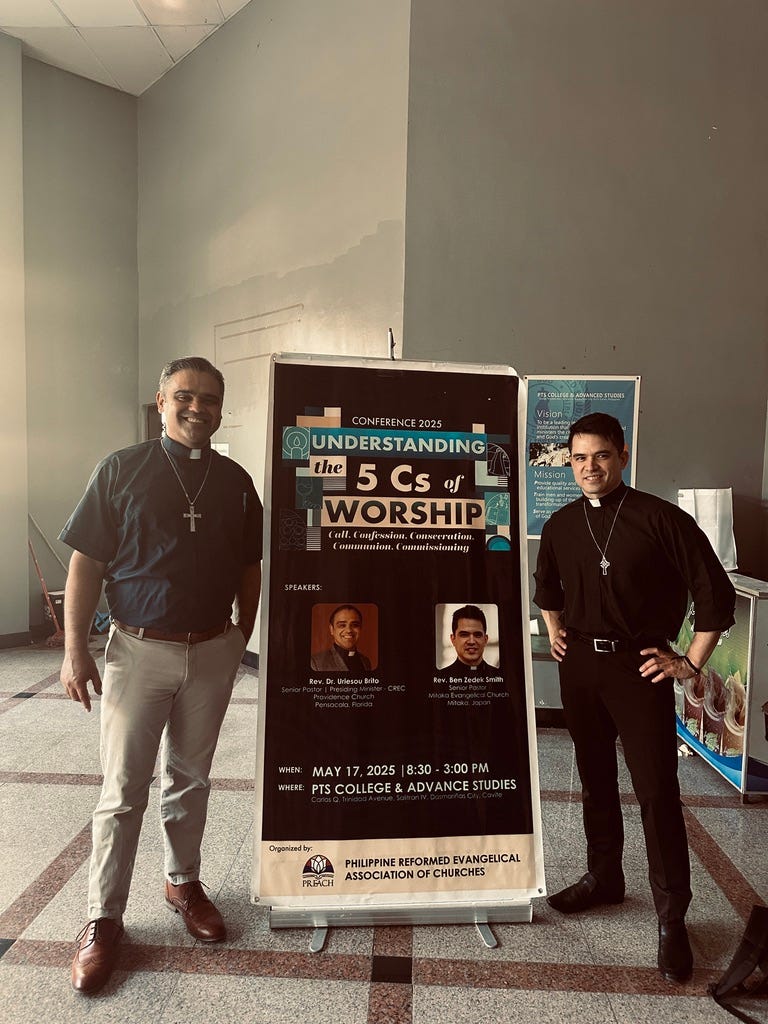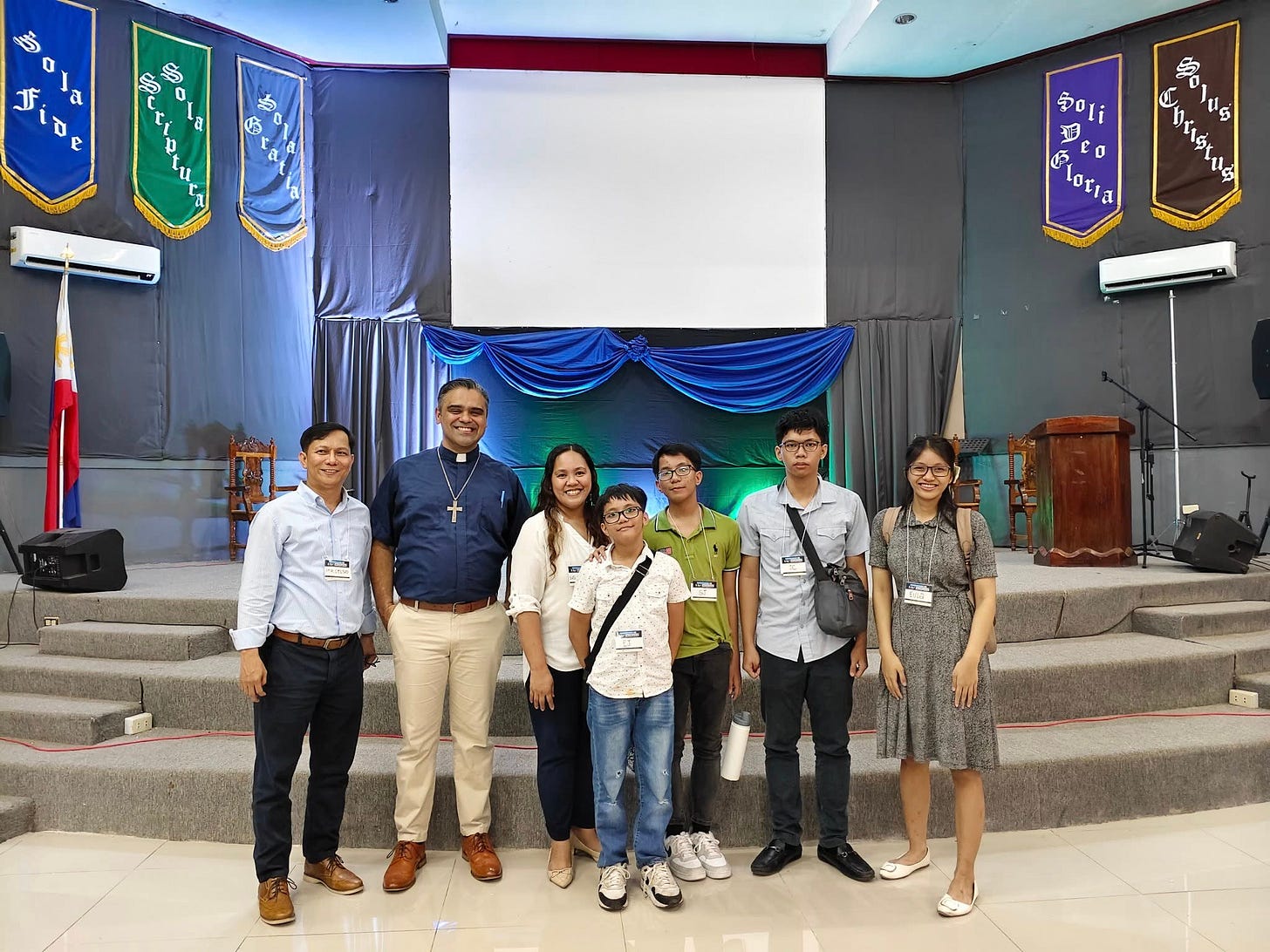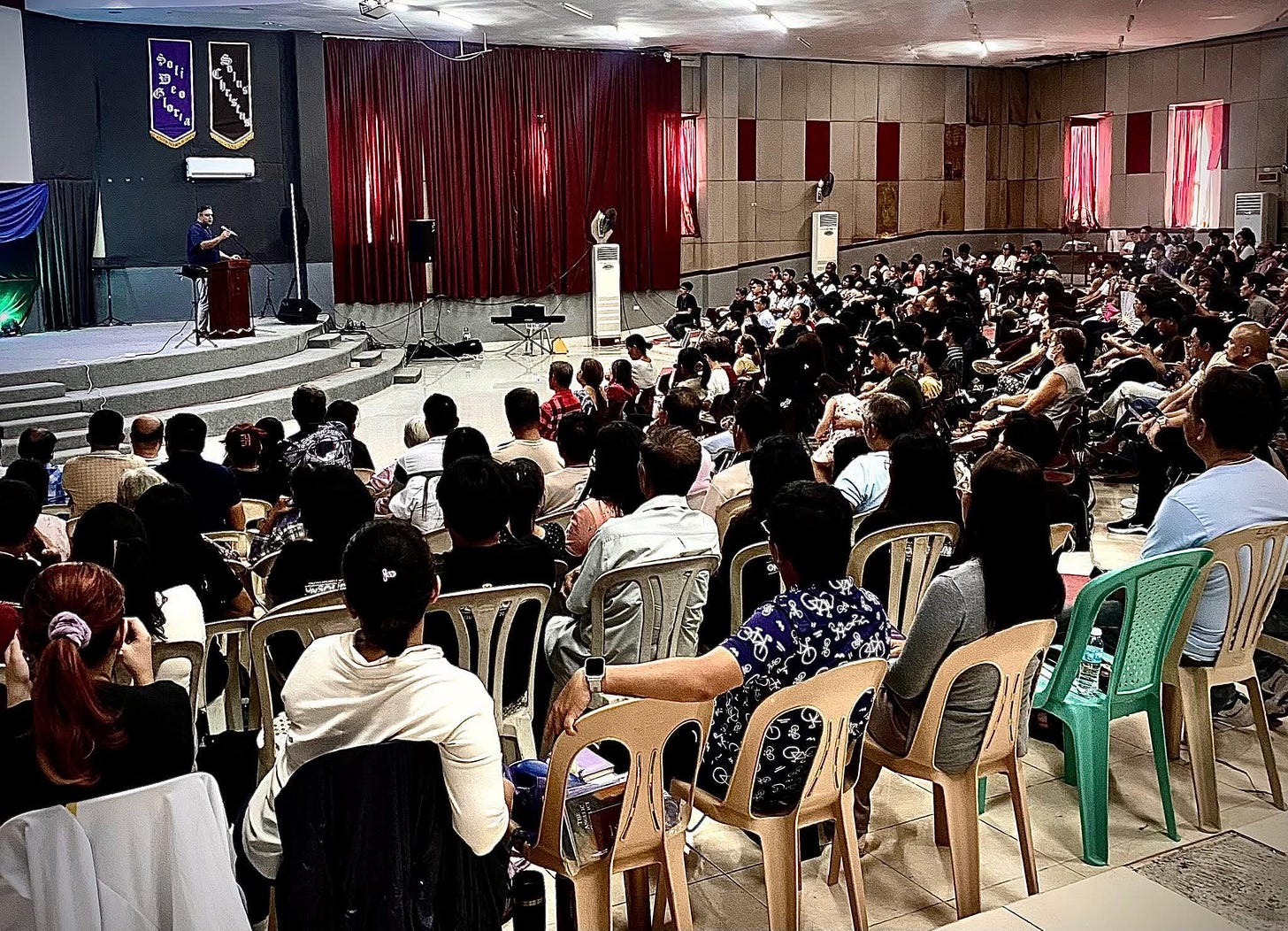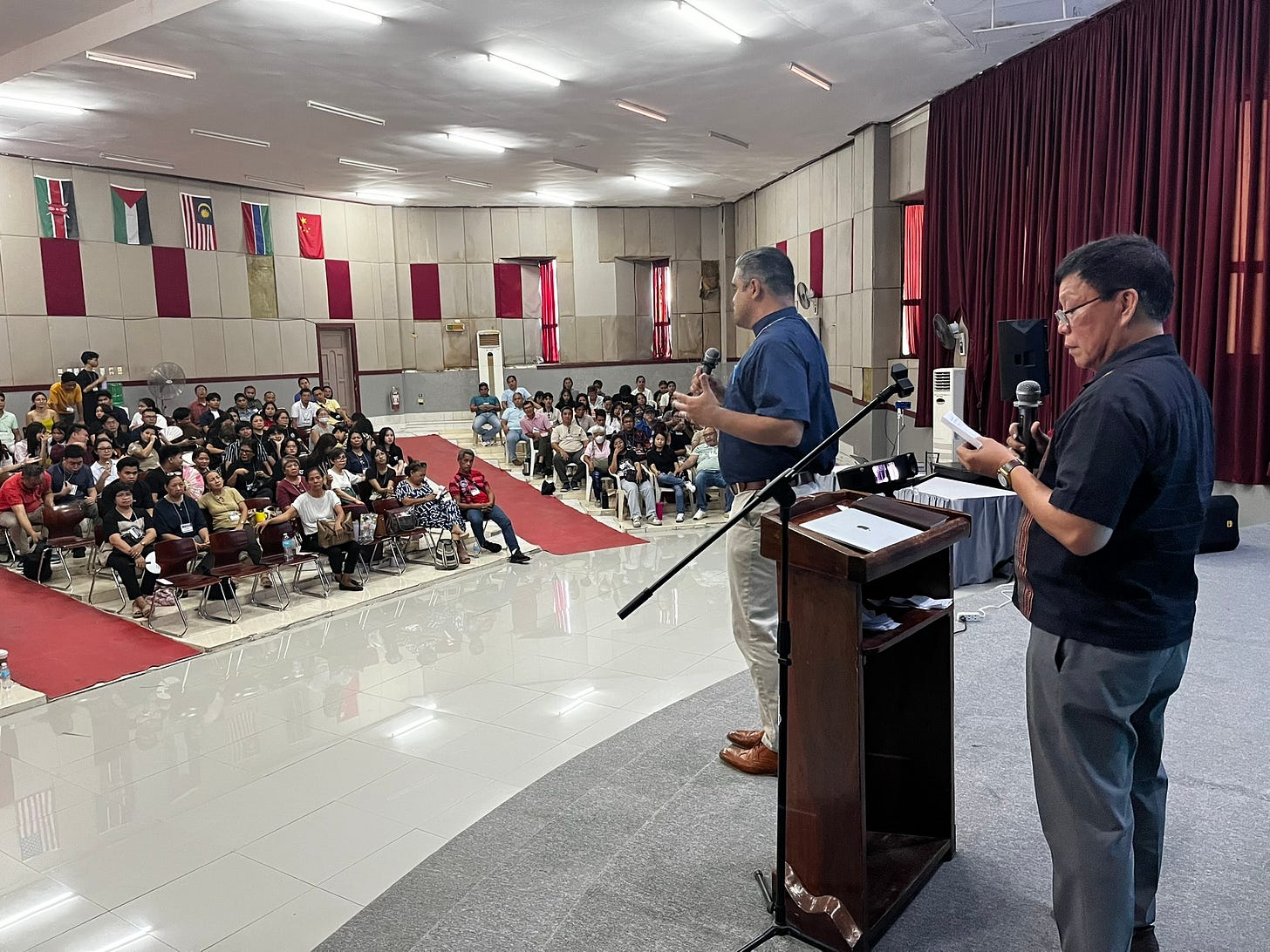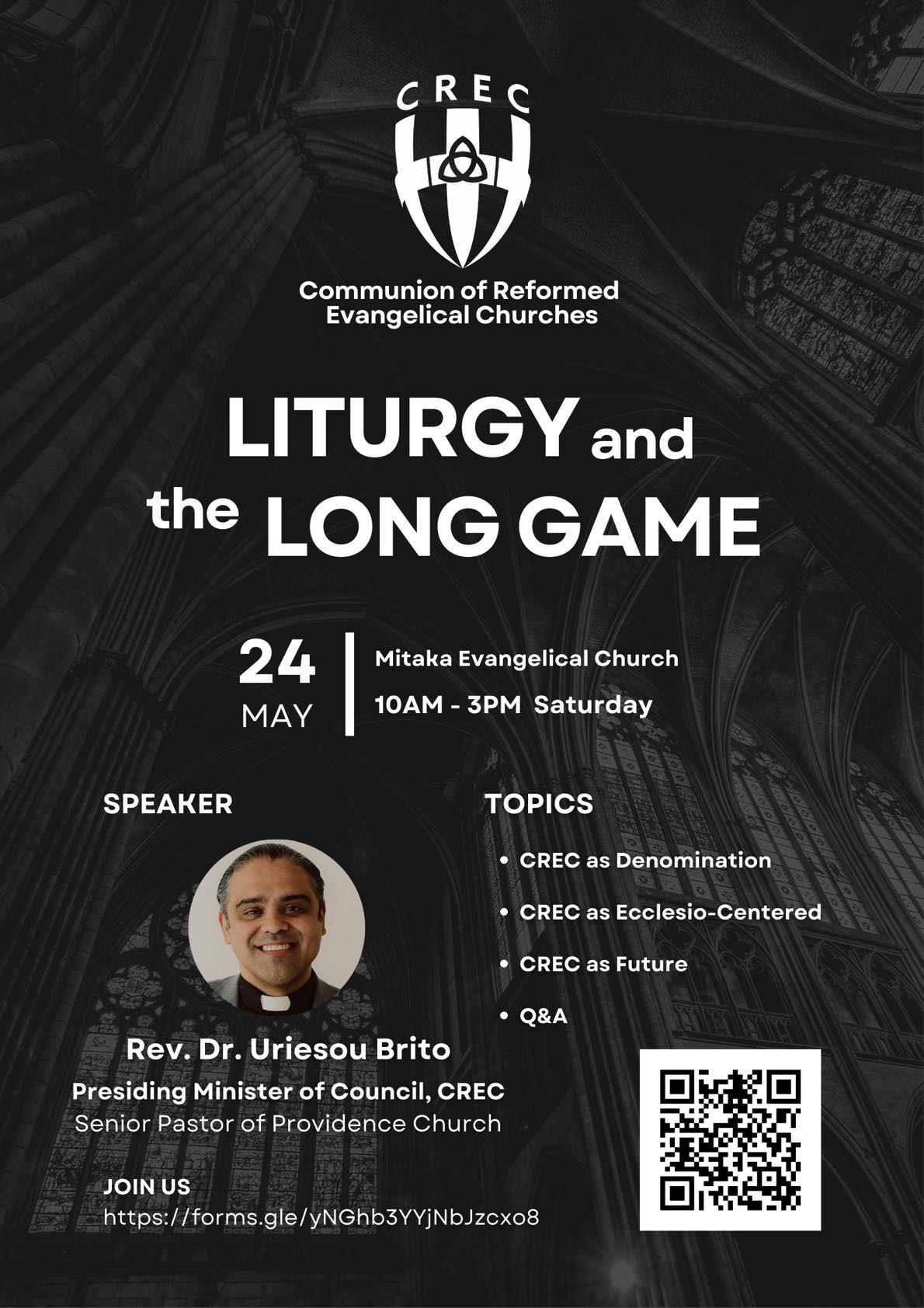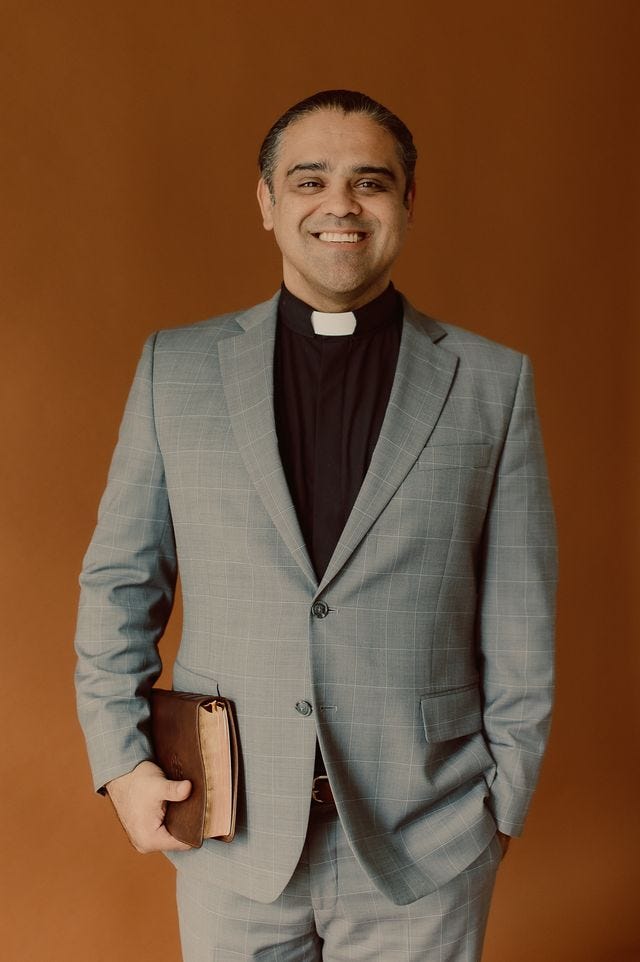Ecclesiology and Liturgy in the Philippines: An Overview of the Conference
Plus notes on the early church and upcoming conferences.
I am learning my way around quite nicely. We have put on quite a few miles on foot. We are in Kyoto for a few days before returning to Tokyo for a few meetings, speaking, and preaching.
It’s hard to believe I’ve been in Asia for almost two weeks. I arrived in Tokyo on the 13th of May (Tokyo time), remaining about 20 hours before flying to Manila for several days. Our arrival offered me an opportunity to meet the pastors in a relatively intimate environment, inquire about the labors of the CREC in the country, and then offer some wisdom on how to proceed on matters about culture, theology, and liturgy.
We returned from that trip in a van. Our driver was a fairly wild man. If you are used to driving in third-world countries, you may know what we experienced. From my perspective, I’ve seen this a fair bit in my home country, but nothing at the level of Manila during traffic hours. Our driver looked proficient in his art of detecting and prophesying movements. My friend, Ben Zedek, says they beep to alert you of their presence. There isn’t much harmony in communication, except that a form of communication is taking place. And, I tell you, it is not for the faint of heart. The sense of proximity is entirely different than what we have in the U.S., but somehow they manage quite well.
Conference on Covenant Renewal Worship
We were up early on Saturday morning. Our driver was prompt to pick us up from the hotel and take us to the conference location at the Presbyterian Seminary in Manila. I honestly did not know what to expect. I knew the venue could hold a couple of hundred people, but over 250 attended the conference.
The PREACH folks put together a great conference. They told us that if they had a bigger venue, they could have easily doubled the numbers. I was also encouraged by the number of young folks who attended. They were hungry for liturgy and asked pertinent questions during the breaks.
I had the chance to enjoy their company and take dozens of pictures. The Filipino people love to mark events, and seeing so many smiles throughout the conference was such a joy. The audience was a very responsive crowd, so I used some key phrases to have them reiterate. I brought up elements like:
“Worship is warfare.”
“Worship is hard.”
“God demands our postures.”
“Worship is for children.”
These kept them fairly engaged through the talks and gave them a category to keep in mind afterwards.
The First Talk: Worship is Hard and Worship Demands Our Bodies
I spent the first talk on the nature of worship. I argued for the following premises:
Worship Requires Perseverance – Obeying God’s commands (Eph. 6:18) calls for diligence. Grace is not an excuse for laziness but a motivation for wholehearted service.
The Lord’s Day Matters – While worship can occur anywhere, God prioritizes gathered worship on Sunday (Rev. 1:10; Heb. 10:25). Avoiding Sunday worship undermines God's appointed time and community worship.
Worship Involves Physical and Active Participation – Worship is not passive; it involves bodily postures and active engagement from those who are able.
Repetition and Patterns Are Valuable – Worship, like other aspects of life, follows patterns (Rev. 7:15). Repetition is not boring but necessary and God-honoring, countering a consumerist thirst for novelty.
God-Centered Worship Counters Passivity – Modern trends often reflect “moralistic therapeutic deism,” encouraging passive worship where only leaders act while congregants sit as spectators. This undermines the majesty of God and the seriousness of worship.
Worship Shapes Life Habits – A worship practice that demands effort fosters consistency in life. A call to work hard in other areas of life should align with an equally serious attitude toward worship.
Worship is meant to be rigorous and participatory, reflecting God's greatness and shaping a life of consistency, discipline, and devotion. Passive, easy worship fails to meet biblical standards and cultivates spiritual laziness.
The Second Talk: The Case for Biblically-Saturated Worship and Weekly Communion
"One of my goals was to highlight a cultural shift in how Christians, particularly evangelicals, view the Bible. Once universally accepted as authoritative, the Bible is now often treated as optional or used selectively. This erosion of confidence in Scripture is particularly evident among youth raised in evangelical homes who were not taught to root their beliefs in the authority of the Bible firmly.
I made the case that the Church must reclaim the doctrine of Sola Scriptura—Scripture alone as the highest authority—which not only defines the Church's language and worship but also serves as God's own unchanging language, grounding Christian identity and shaping ethical, theological, and communal life.
Furthermore, Sola Scriptura unites the Church by offering a shared, authoritative foundation. This doctrine is different from Solo Scriptura—the idea that Scripture is the only authority to the exclusion of all others. Solo Scriptura leads to spiritual individualism and division. True unity in the Church comes from recognizing Scripture as supreme while valuing other authorities, such as pastors and creeds, under its guidance. The consistent use of Scripture in worship, teaching, and discipleship helps form a biblically literate and spiritually mature congregation, protecting it from cultural relativism and doctrinal confusion.
Lastly, I focused on the importance of the Lord’s Supper as a regular, central element of Christian worship. Drawing from Scripture, Church history, and Reformed theology, I used my lecture to defend the practice of weekly communion. The Supper is not just a symbolic act, but a real means of grace that nourishes, unites, and strengthens the Church for its mission. The modern, trivialized versions of communion damage the church’s witness. If we return to partaking of the Table weekly, the Church will be renewed in her identity and purpose, ultimately reflecting the unity and gratitude that Sola Scriptura aims to foster.
Q&A Time
Ben Zedek did a splendid job addressing the call, confession, and commissioning. His talks were well-researched, and he engaged the audience wonderfully. The final session was a potpourri of questions from the audience, including questions about transubstantiation, weekly communion, the relationship of discipline and sacraments, Calvin’s view of the Lord’s Supper, the purpose of worship, etc. This second took almost an hour, and Ben and I complemented each other well in our answers.
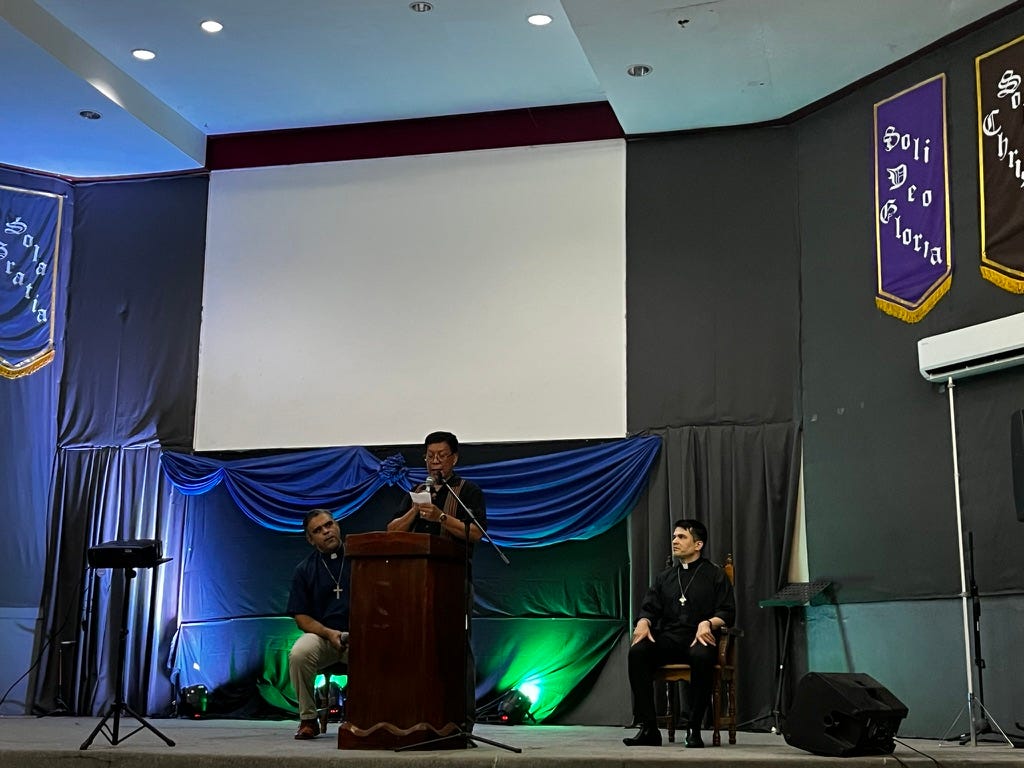
The conference ended splendidly, and there were some follow-up questions afterwards. We stayed around, took pictures, and chatted with our newfound friends. Only one final day remained in the Philippines: the Lord’s Service. Everything we had talked about in our lectures would find its culmination at the Lord's table. Our talks would be applied in the worship services the following day, and what a splendid day it was!
Nuntium
I will be back in Tokyo this weekend to speak at a conference and preach on the Lord’s Day at Mitaka Evangelical Church:
Though this has been a lengthy season of international travel, I look forward to speaking at a conference in Porto Alegre with my old friend, Peter Leithart. We will be delivering lectures on typology in Brazil in early September. Here’s my plug in Portuguese:
Notations
Evangelicals do not believe that Jesus is the Son of God:
On returning to the early church:
Make no mistake: the early church was glorious! She was glorious like a child is glorious. She was but a babe. She breathed, moved, and had her being in God. She was a nursing infant. She had to trust in God from the beginning. But it has become common practice to look to the early church as some paragon of perfection.
“If only we could go back!”
The nostalgic sentiments echo through the corridors of sentimentalists. The truth is that the early church was a relatively unstable body. Paul strives to offer her detailed instructions. Sometimes these instructions are simple: love one another. Sometimes Paul bombards them with rebuke, as in I Corinthians. But if the early church was such a model, why then did Paul chastise and treat them as little children again and again? The answer couldn’t be more straightforward: because the early church was never meant to be an example to be followed in all ages. She was meant to be a foundational model. She was meant to give us the essential ingredients of life together (Acts 2:42), but not to be the model of the 21st-century church.
James Montgomery Boice summarized this sentiment well:
Whole denominations are founded upon the idea that the prime duty of contemporary Christians is to be as much like those who lived in the age of the apostles as possible. But this is a false idealization; it is an attempt to make the early church into something it never was. It is an attempt to escape the problems of our day by looking back to something that exists only in the Christian imagination. a
This prevailing idea strongly opposes the maturational intention of biblical revelation. As Paul says, we were not meant to remain infants but to grow into mature men. To be sure, Acts provides helpful themes of charity, mercy, communion, and more, but she was a seed, not the tree itself. The tree itself is what God is accomplishing through all ages: to form one, holy, catholic, and apostolic church. The Spirit of God, who has hovered over the church throughout the ages, continues to hover even today, bringing the Church to greater glory and might, strengthening and building her to be that indestructible rock that will shatter the heads of the enemies.
We are not called to put faith in the Church of the past, but in the Head of the Church, Jesus Christ, who reigns over his Church now, world without end, Amen.
An Expositional Commentary, Boice, 56 (back)
Christ is Risen, indeed!
Uriesou T. Brito
FOLLOW ALONG
FACEBOOK / X / YOUTUBE / INSTAGRAM
PODCAST / KUYPERIAN / SUBSTACK


